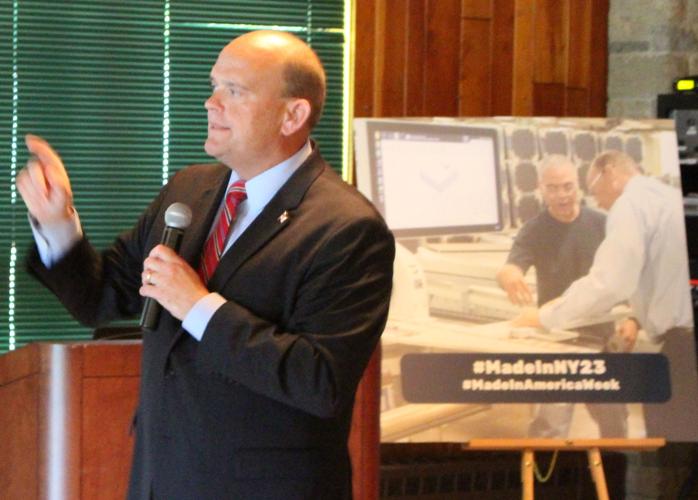ALFRED — More than 125 attended U.S. Rep. Tom Reed’s fourth annual Manufacturing Summit Friday at Alfred State’s Lake Lodge.
It was the largest gathering for a manufacturing summit, an aide to the Corning Republican said.
Alfred State College President Skip Sullivan welcomed the attendees to Lake Lodge because prospective students were visiting the campus and using the larger venues. He said the college offers training for manufacturing jobs and looks forward to more manufacturing moving to the region.
The first presentations eplained different programs helping to revitalize American manufacturing through the Manufacturing USA Program and the Revitalize American Manufacturing Initiative (RAMI) Act Reed cosponsored n 2014.
“You are the economic engine of our district,” moderator Mike Molnar, director of the Advanced Manufacturing National Program Office, told the small- and medium-sized sized manufacturing company owners and representatives.
The loss of one-third of the country’s manufacturing base has long-range implications, Molnar said.
“Where you make these advanced manufacturing products really matters,” he said.
Molnar said the U.S. has slipped to No. 2 in world manufacturing, it is No. 1 in advanced manufacturing.
The Manufacturing USA Program helps companies solve advanced manufacturing challenges. It is where industry and academia can work together connecting people, ideas and technology.
Nabil Nasr, CEO of REMADE Manufacturing USA Institute, said his program focuses on early stage research and development with companies in a bid to bridge the gap between research and development, implementation and jobs.
Ed White, a vice president at the AIM Photonics Manufacturing USA Institute in Albany, where they are researching the next step in miniaturization, using light instead of an electrical charge to speed up devices.
In Rochester, a new facility to provide clean room space for companies to come to develop their products is being built at a former Kodak test facility. High-tech equipment including a scanning electron microscope is available for use. “Customers are already lining up,” he added.
The Manufacturing Extension Partnership provides consulting services for small to mid-size manufacturers to help them compete on a global scale, said Ben Rand, president of Insyte Consulting. The partnership’s services across the state have created or saved 12,000 jobs, said Ben Rand, Insyte president.
In a second round of presenters and question and answer session, a familiar problem was addressed: How do companies get skilled workers.
Paul Carrick, vice president of The Manufacturing Institute, said, “attracting and retaining quality workers” is at the top of the list of concerns for manufacturers.
There are 450,000 open U.S. manufacturing jobs that cannot be filled with trained workers. By 2025, that could reach 2 million unfilled manufacturing jobs. Expanding programs for apprenticeships, internships, school partners, certifications and military to manufacturing will help close that gap, Carrick said.
Anne DeCesare, staff director of the Human Resources Subcommittee of the House Ways and Means Committee, said social services programs can also be a source for new employees. She described help for individuals and companies under the Jobs for Success Act. It also helps employees address child care, transportation and healthcare.
A Department of Labor official, Bernard Treml III of the Office of Apprenticeship, said President Donald Trump has signed executive orders to expand apprenticeship programs in the Departments of Labor, Education and Commerce.
Reed, who thanked attendees for participating in the Manufacturing Summit, said he wanted people to take away new relationships with other manufacturers and to see how they could become part of new supply chains for advanced manufacturing.
The innovation to implementation approach to advanced manufacturing will lead to long-term relationships and growth in manufacturing jobs, Reed said.
The presentations on workforce skills showed that the biggest threat to manufacturers is workforce development. Many who are available to work don’t have access to the skills they need for advanced manufacturing jobs, Reed said.
Earlier, attendees toured Alstom’s Hornell plant where they build and refurbish rail passenger cars. The multinational company operates in rail transport markets worldwide.
(Contact reporter Rick Miller at rmiller@oleantimesherald.com. Follow him on Twitter, @RMillerOTH)






